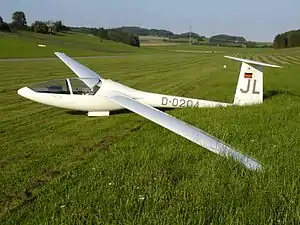Glasflügel 401
The Glasflügel H-401 "Kestrel" is a glider that was developed in 1968 for the open class. It has a wingspan of 17 metres. It is named after the kestrel bird.
| 401 Kestrel | |
|---|---|
 | |
| Glasflügel 401 Kestrel | |
| Role | Open class sailplane |
| National origin | Germany |
| Manufacturer | Glasflügel |
| Designer | Eugen Hänle |
| First flight | 9 August 1968 |
| Number built | 129 |
| External image | |
|---|---|
History
Between 1968 and 1975 Glasflügel built 129 Kestrels.
The British company Slingsby built the Kestrel under license as the T59 and T59B. The T59B has a wingspan of 19 metres and was developed for the 1970 World Gliding Championships.[1]
On 18 May 2005, Gordon Boettger flew 2061 km in his Kestrel in lee waves along the Sierra Nevada in the USA.[2]
Specifications
General characteristics
- Crew: One pilot
- Length: 6.72 m (22 ft 1 in)
- Wingspan: 17.00 m (55 ft 9 in)
- Wing area: 11.6 m2 (125 sq ft)
- Aspect ratio: 25
- Empty weight: 260 kg (570 lb)
- Gross weight: 400 kg (880 lb)
Performance
- Maximum speed: 250 km/h (160 mph, 140 kn)
- Maximum glide ratio: 43:1
See also
Related development
Aircraft of comparable role, configuration, and era
Related lists
Notes
- Ellison, Norman (1971), British Gliders and Sailplanes, p.230. A & C Black, Limited, London. ISBN 0-7136-1189-8
- FAI 2000 km Flight Register Archived 2011-10-20 at the Wayback Machine Retrieved 2012-01-02
References
| Wikimedia Commons has media related to Glasflügel 401 Kestrel. |
- Flight Manual
- Die Entwicklung der Kunststoffsegelflugzeuge, Dietmar Geistmann, Motorbuchverlag, ISBN 3-87943-483-2
- Sailplane Directory
This article is issued from Wikipedia. The text is licensed under Creative Commons - Attribution - Sharealike. Additional terms may apply for the media files.